专四必考词义辨析
英语专业四级(专四)词语辨析大全,还挺有用的!
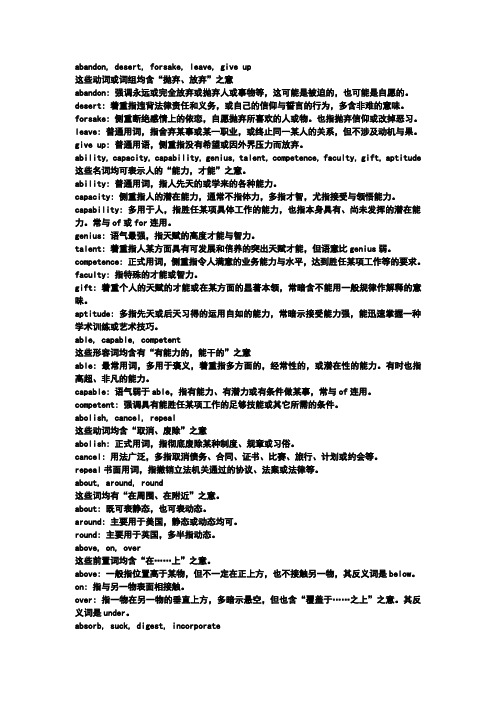
abandon, desert, forsake, leave, give up这些动词或词组均含“抛弃、放弃”之意abandon: 强调永远或完全放弃或抛弃人或事物等,这可能是被迫的,也可能是自愿的。
desert: 着重指违背法律责任和义务,或自己的信仰与誓言的行为,多含非难的意味。
forsake: 侧重断绝感情上的依恋,自愿抛弃所喜欢的人或物。
也指抛弃信仰或改掉恶习。
leave: 普通用词,指舍弃某事或某一职业,或终止同一某人的关系,但不涉及动机与果。
give up: 普通用语,侧重指没有希望或因外界压力而放弃。
ability, capacity, capability, genius, talent, competence, faculty, gift, aptitude 这些名词均可表示人的“能力,才能”之意。
ability: 普通用词,指人先天的或学来的各种能力。
capacity: 侧重指人的潜在能力,通常不指体力,多指才智,尤指接受与领悟能力。
capability: 多用于人,指胜任某项具体工作的能力,也指本身具有、尚未发挥的潜在能力。
常与of或for连用。
genius: 语气最强,指天赋的高度才能与智力。
talent: 着重指人某方面具有可发展和倍养的突出天赋才能,但语意比genius弱。
competence: 正式用词,侧重指令人满意的业务能力与水平,达到胜任某项工作等的要求。
faculty: 指特殊的才能或智力。
gift: 着重个人的天赋的才能或在某方面的显著本领,常暗含不能用一般规律作解释的意味。
aptitude: 多指先天或后天习得的运用自如的能力,常暗示接受能力强,能迅速掌握一种学术训练或艺术技巧。
able, capable, competent这些形容词均含有“有能力的,能干的”之意able: 最常用词,多用于褒义,着重指多方面的,经常性的,或潜在性的能力。
有时也指高超、非凡的能力。
专四最完整词汇辨析
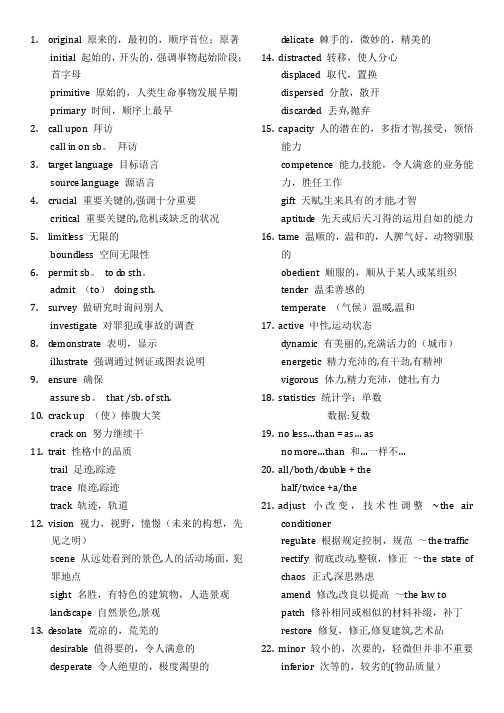
1.original 原来的,最初的,顺序首位;原著initial 起始的,开头的,强调事物起始阶段;首字母primitive 原始的,人类生命事物发展早期primary 时间,顺序上最早2.call upon 拜访call in on sb。
拜访3.target language 目标语言source language 源语言4.crucial 重要关键的,强调十分重要critical 重要关键的,危机或缺乏的状况5.limitl ess 无限的boundl ess 空间无限性6.permit sb。
to d o sth。
admit (to)d oing sth.7.survey 做研究时询问别人investigate 对罪犯或事故的调查8.d emonstrate 表明,显示illustrate 强调通过例证或图表说明9.ensure 确保assure sb。
that /sb. of sth.10.crack up (使)捧腹大笑crack on 努力继续干11.trait 性格中的品质trail 足迹,踪迹trace 痕迹,踪迹track 轨迹,轨道12.vision 视力,视野,憧憬(未来的构想,先见之明)scene 从远处看到的景色,人的活动场面,犯罪地点sight 名胜,有特色的建筑物,人造景观landscape 自然景色,景观13.d esolate 荒凉的,荒芜的d esirable 值得要的,令人满意的d esperate 令人绝望的,极度渴望的d elicate 棘手的,微妙的,精美的14.distracted 转移,使人分心displaced 取代,置换dispersed 分散,散开discard ed 丢弃,抛弃15.capacity 人的潜在的,多指才智,接受,领悟能力competence 能力,技能,令人满意的业务能力,胜任工作gift 天赋,生来具有的才能,才智aptitud e 先天或后天习得的运用自如的能力16.tame 温顺的,温和的,人脾气好,动物驯服的obedient 顺服的,顺从于某人或某组织tend er 温柔善感的temperate (气候)温暖,温和17.active 中性,运动状态dynamic 有美丽的,充满活力的(城市)energetic 精力充沛的,有干劲,有精神vigorous 体力,精力充沛,健壮,有力18.statistics 统计学:单数数据:复数19.no less…than = as… asno more…than 和…一样不…20.all/both/d oubl e + thehalf/twice +a/the21.adjust 小改变,技术性调整~the airconditionerregulate 根据规定控制,规范~the trafficrectify 彻底改动,整顿,修正~the state of chaos 正式,深思熟虑amend 修改,改良以提高~the law topatch 修补相同或相似的材料补缀,补丁restore 修复,修正,修复建筑,艺术品22.minor 较小的,次要的,轻微但并非不重要inferior 次等的,较劣的(物品质量)secondary 重要性或顺序上的第二位subordinate 从属,下级的,强调主次地位23.bounce (球)反弹,(人)蹦跳bound 跳跃,(弹性,轻捷,优美)hop 单脚跳l eap 飞跃,跃进make a great ~24.chaos 极度杂乱,完全混乱disord er 缺乏整齐,顺序in ~mess 十分肮脏,不整齐in a ~riot 暴乱in the ~s25.ban 官方禁止forbid 普通用语,要求遵守veto 国王,总统否决法案boycott 联合抵制,拒买*26.accuse ~sb。
专四必看词语辨析

专四必看词语辨析considerable――“相当大(或多)的”体贴-描述“体贴,体贴,体贴”(准备或连接)“考虑,考虑”productive――丰饶的,多产的富足——富足,富足,富足profound――很深的,深远的,很远的,深厚的prosperous――繁荣的,昌盛的可敬的——可敬的,可敬的(带有被动意义)——各自的respectful――尊敬人的,尊重人的,恭敬的(主动意义)respecting――(prep)关于腾出,腾出,腾出,腾出,离开,出发短语:getawaywith成功地行骗,侥幸的获取Suchastodo导致状语“so…That…”顶住\语法:therebeing表示原因1.一想到?2.asawhole(=ingeneral)就整体而论3.atwill随心所欲4.偶然的,偶然的;偶然的;偶然的;偶然的;偶然的;偶然的;偶然的,7.ofone’sownaccord(=withoutbeingasked;willingly;free ly)自愿地,主动地8.不符合和?协定不符合某人的习惯?。
不一致9.与每份订单一致10.与根据11.onone'sownaccount1)为了某人的缘故,为了某人自己的利益2)(=atone’sownrisk)自行负责3)(=byoneself)依靠自己12.吃什么?考虑,考虑。
考虑到13.givesb.anaccountof说明,解释(理由)解释,解释解释解释。
例如:因为。
18.beaccustomedto(=beinthehabitof,beusedto)习惯于。
19.了解;(在社交上)熟悉20.acton奉行,按照?行动;actas扮演;actfor代理21.adaptoneselfto(=adjustoneselfto)使自己适应于22.适应?使某物适合新的需要23.inaddition(=besides)此外,又,加之24.除此之外?外部28.admitof(=becapableof,leaveroomfor)?的可能,留有?的余地。
专四常见词辨析

1、dominant, predominant, sovereign这些形容词均含有“占优势的,支配其它的”之意。
dominant : 强调权威。
The British were formerly dominant in India.(英国人从前统治印度。
)predominant : 侧重指影响与新近的优势。
The predominant feature of his character was pride.(他的性格中主要的特点是骄傲。
)sovereign : 侧重指其他事物都从属于或低于它的。
The Queen has sovereign power.(女王握有2 、disgrace, humiliate, shame, dishonour这些动词均含“使丢脸、使受耻辱”之意。
disgrace : 侧重在别人,尤其在众人面前丢脸。
They have disgraced the whole school.(他们给整个学校都丢了脸。
)humiliate : 强调受辱者自尊心的损坏。
Parents are humiliated if their children behave badly when guests are present.(子女在客人面前举止失当, 父母也失体面。
)shame : 指由不光彩或不道德的行为引起的惭愧感或羞耻感。
The class's unruly behaviour shamed the teacher.(这班学生不守规矩的行为使老师感到羞愧。
)dishonour : 有时可与disgrace换用,但前者是指因失去荣誉所致。
There’s no dishonour in losing.(失败并不是耻辱。
)3、discern, discriminate, distinguish这些动词均有“区别、辨别”之意。
discern : 语义较笼统,着重精深与准确的观察力,不一定有能分辨关系密切的各项事物的含义。
专四词义辨析汇总
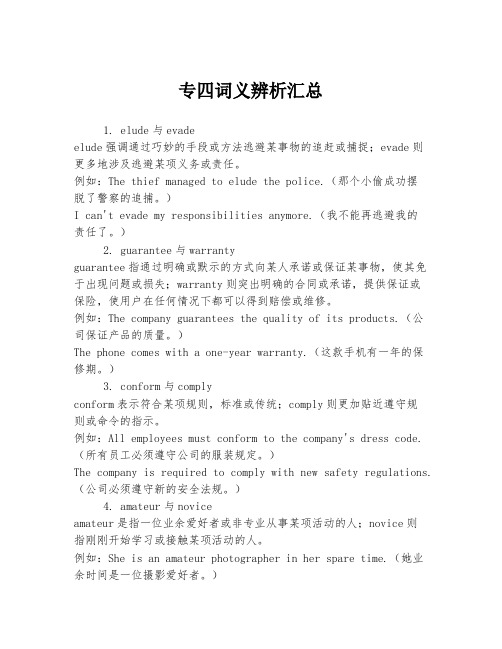
专四词义辨析汇总1. elude与evadeelude强调通过巧妙的手段或方法逃避某事物的追赶或捕捉;evade则更多地涉及逃避某项义务或责任。
例如:The thief managed to elude the police.(那个小偷成功摆脱了警察的追捕。
)I can't evade my responsibilities anymore.(我不能再逃避我的责任了。
)2. guarantee与warrantyguarantee指通过明确或默示的方式向某人承诺或保证某事物,使其免于出现问题或损失;warranty则突出明确的合同或承诺,提供保证或保险,使用户在任何情况下都可以得到赔偿或维修。
例如:The company guarantees the quality of its products.(公司保证产品的质量。
)The phone comes with a one-year warranty.(这款手机有一年的保修期。
)3. conform与complyconform表示符合某项规则,标准或传统;comply则更加贴近遵守规则或命令的指示。
例如:All employees must conform to the company's dress code.(所有员工必须遵守公司的服装规定。
)The company is required to comply with new safety regulations.(公司必须遵守新的安全法规。
)4. amateur与noviceamateur是指一位业余爱好者或非专业从事某项活动的人;novice则指刚刚开始学习或接触某项活动的人。
例如:She is an amateur photographer in her spare time.(她业余时间是一位摄影爱好者。
)As a novice dancer, he struggled to keep up with the rest of the class.(作为一个初学者舞蹈者,他在课堂上难以跟上节奏。
大学英语四级考试常考词语辨析精解 (60组, 334个单词)
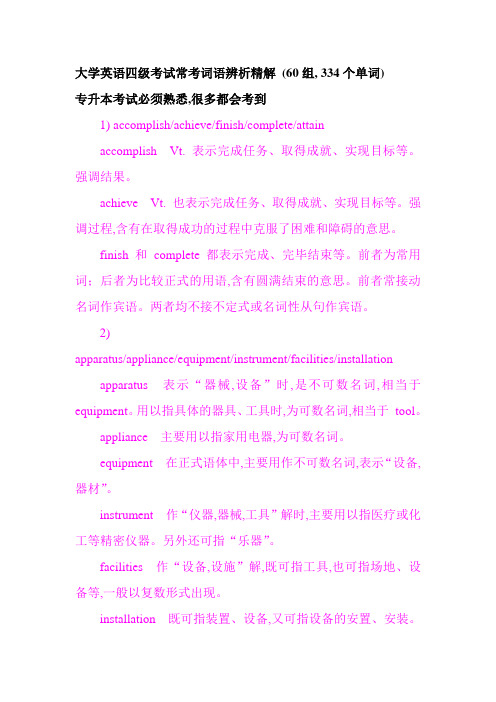
大学英语四级考试常考词语辨析精解(60组, 334个单词)专升本考试必须熟悉,很多都会考到1) accomplish/achieve/finish/complete/attainaccomplish Vt. 表示完成任务、取得成就、实现目标等。
强调结果。
achieve Vt. 也表示完成任务、取得成就、实现目标等。
强调过程,含有在取得成功的过程中克服了困难和障碍的意思。
finish 和complete 都表示完成、完毕结束等。
前者为常用词;后者为比较正式的用语,含有圆满结束的意思。
前者常接动名词作宾语。
两者均不接不定式或名词性从句作宾语。
2)apparatus/appliance/equipment/instrument/facilities/installation apparatus 表示“器械,设备”时,是不可数名词,相当于equipment。
用以指具体的器具、工具时,为可数名词,相当于tool。
appliance 主要用以指家用电器,为可数名词。
equipment 在正式语体中,主要用作不可数名词,表示“设备,器材”。
instrument 作“仪器,器械,工具”解时,主要用以指医疗或化工等精密仪器。
另外还可指“乐器”。
facilities 作“设备,设施”解,既可指工具,也可指场地、设备等,一般以复数形式出现。
installation 既可指装置、设备,又可指设备的安置、安装。
3) argue/dispute/debate/discuss/quarrel前四个词都有“辩论”的意思,但各有侧重;quarrel 则指“争吵”。
argue 指就自己的看法或立场提出论证,和人家辩论,着重“说理”、“论证”和“企图说服”。
可接that 引导的名词从句。
dispute 意味着意见有分歧,争论激烈,常含有“相持不下”或“未得解决”的意思。
不接名词从句。
debate 着重在正式场合(如辩论会),和意见对立的人进行全面的、彻底的辩论,各自陈述自己的理由。
英语专业四级(TEM4)词汇辨析共53页文档

31、只有永远躺在泥坑里的人,才不会再掉进坑里。——黑格尔 32、希望的灯一旦熄灭,生活刹那间变成了一片黑暗。——普列姆昌德 33、希望是人生的乳母。——科策布 34、形成天才的决定因素应该是勤奋。——郭沫若 35、学到很多东西的诀窍,就是一下子不要学很多。——洛克
英语专业四级(TEM4)词汇辨析
1、纪律是管理关系的形式。——阿法 纳耶 夫 2、改革如果不讲纪律,就难以成功。
3、道德行为训练,不是通过语言影响 ,而是 让儿童 练习良 好道德 行为, 克服懒 惰、轻 率、不 守纪律 、颓废 等不良 行为。 4、学校没有纪律便如磨房里没有水。 ——夸 美纽斯
5、教导儿童服从真理、服从集体,养 成儿童 自觉的 纪律性 ,这是 儿童道 德教育 最重要 的部分 。—— 陈鹤琴
英语专业四级词汇词义辨析
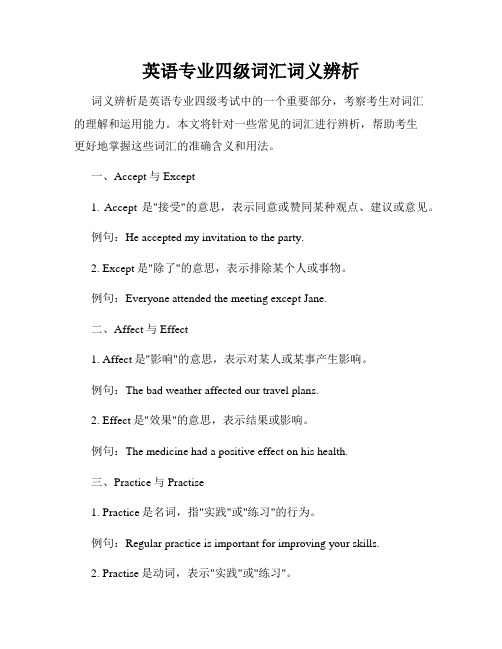
英语专业四级词汇词义辨析词义辨析是英语专业四级考试中的一个重要部分,考察考生对词汇的理解和运用能力。
本文将针对一些常见的词汇进行辨析,帮助考生更好地掌握这些词汇的准确含义和用法。
一、Accept与Except1. Accept是"接受"的意思,表示同意或赞同某种观点、建议或意见。
例句:He accepted my invitation to the party.2. Except是"除了"的意思,表示排除某个人或事物。
例句:Everyone attended the meeting except Jane.二、Affect与Effect1. Affect是"影响"的意思,表示对某人或某事产生影响。
例句:The bad weather affected our travel plans.2. Effect是"效果"的意思,表示结果或影响。
例句:The medicine had a positive effect on his health.三、Practice与Practise1. Practice是名词,指"实践"或"练习"的行为。
例句:Regular practice is important for improving your skills.2. Practise是动词,表示"实践"或"练习"。
例句:You should practise speaking English every day.四、Artificial与Artistic1. Artificial是形容词,表示"人造的"或"人工的"。
例句:She bought an artificial flower for decoration.2. Artistic是形容词,表示"艺术的"或"富有艺术感的"。
专四词汇辨析
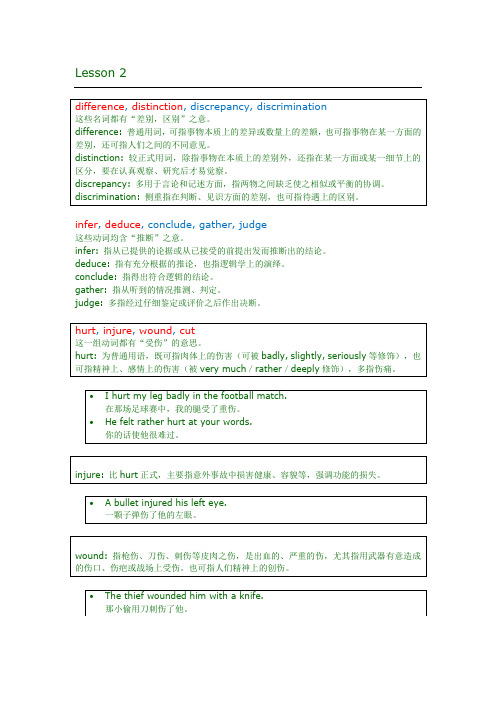
Lesson 2infer, deduce, conclude, gather, judge这些动词均含“推断”之意。
infer: 指从已提供的论据或从已接受的前提出发而推断出的结论。
deduce: 指有充分根据的推论,也指逻辑学上的演绎。
conclude: 指得出符合逻辑的结论。
gather: 指从听到的情况推测、判定。
judge: 多指经过仔细鉴定或评价之后作出决断。
liable, apt, likely, prone, subject这些形容词均含“倾向于……的、易于……的”之意。
liable: 指易于产生某种不利的结果,侧重偶然性,常表示警告或提醒。
apt: 口语中常用,指自然的或习惯的倾向,无特殊的褒贬意味,常指在一般情况下发生的事。
likely: 侧重可能性,用于指将来,预言希望或所不希望的结果。
prone: 多用于人,着重其本性,或倾向于某种错误、弱点或不良行为等。
subject: 指确实可以察觉的倾向,也就是总结出来的规律。
maybe, perhaps, possibly, probably这些副词均有“或许、大概”之意。
maybe: 普通用词,美国英语多用,指某事也许如此,含不能确定意味。
perhaps: 普通用词,多用于英国,与maybe同义。
possibly: 指客观上潜存着发生某种变化的可能。
probably: 一般指根据逻辑推理,估计有发生的可能,把握性较大,语气比possibly强。
list, catalog(ue), register, roll, schedule, table, chart, form这些名词均含“名单、目录、表格”之意。
list: 最普通用词,含义广。
指按字母顺序、时间先后或类别等排列的姓名或项目等的单子。
catalog(ue): 指列出有全部队名、物名或项目等的目录,有时指附有简要说明的分类名单或一览表。
register: 多指官方对人或事作出的正式书面记录或详细清单。
2023年英语专四词汇辨析
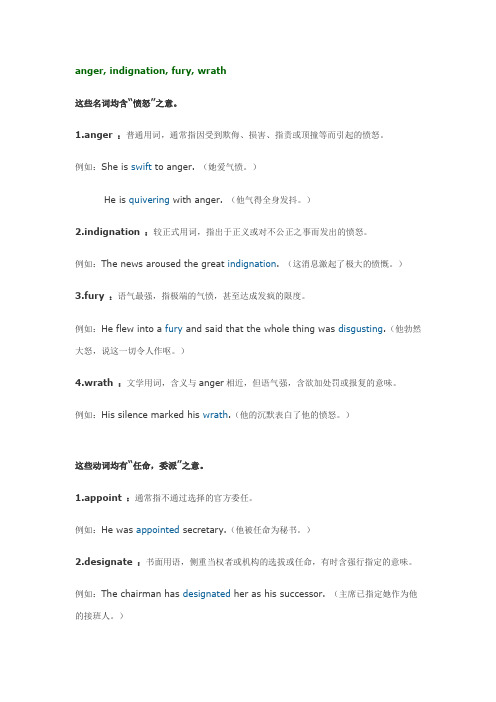
anger, indignation, fury, wrath这些名词均含“愤怒”之意。
1.anger :普通用词,通常指因受到欺侮、损害、指责或顶撞等而引起的愤怒。
例如:She is swift to anger. (她爱气愤。
)He is quivering with anger. (他气得全身发抖。
)2.indignation :较正式用词,指出于正义或对不公正之事而发出的愤怒。
例如:The news aroused the great indignation. (这消息激起了极大的愤慨。
)3.fury :语气最强,指极端的气愤,甚至达成发疯的限度。
例如:He flew into a fury and said that the whole thing was disgusting.(他勃然大怒,说这一切令人作呕。
)4.wrath :文学用词,含义与anger相近,但语气强,含欲加处罚或报复的意味。
例如:His silence marked his wrath.(他的沉默表白了他的愤怒。
)这些动词均有“任命,委派”之意。
1.appoint :通常指不通过选择的官方委任。
例如:He was appointed secretary.(他被任命为秘书。
)2.designate :书面用语,侧重当权者或机构的选拔或任命,有时含强行指定的意味。
例如:The chairman has designated her as his successor. (主席已指定她作为他的接班人。
)3.assign :常指给一群人或个人分派、分派、指派或委派任务。
例如:The captain assigned two soldiers to guard the gate.(上尉派了两个士兵守大门。
) :普通用词,着重任命的结果,而不是过程。
例如:The President named him to be Secretary of State.(总统任命他为国务卿。
专四必考词义辨析
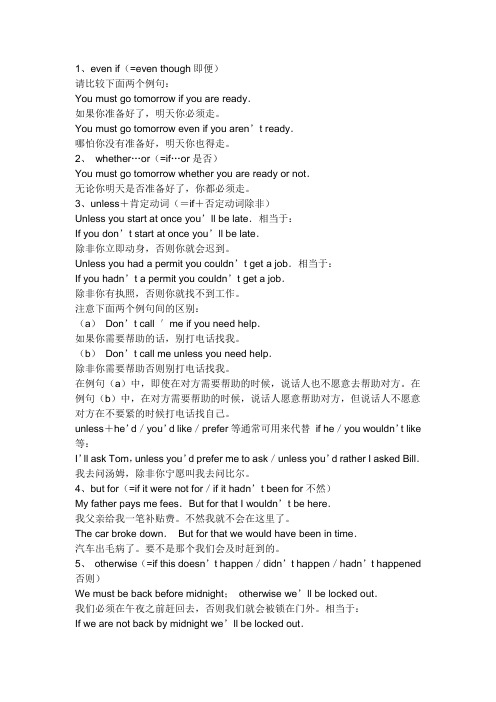
1、even if(=even though即便)请比较下面两个例句:You must go tomorrow if you are ready.如果你准备好了,明天你必须走。
You must go tomorrow even if you aren’t ready.哪怕你没有准备好,明天你也得走。
2、whether…or(=if…or是否)You must go tomorrow whether you are ready or not.无论你明天是否准备好了,你都必须走。
3、unless+肯定动词(=if+否定动词除非)Unless you start at once you’ll be late.相当于:If you don’t start at once you’ll be late.除非你立即动身,否则你就会迟到。
Unless you had a permit you couldn’t get a job.相当于:If you hadn’t a permit you couldn’t get a job.除非你有执照,否则你就找不到工作。
注意下面两个例句间的区别:(a)Don’t call ′me if you need help.如果你需要帮助的话,别打电话找我。
(b)Don’t call me unless you need help.除非你需要帮助否则别打电话找我。
在例句(a)中,即使在对方需要帮助的时候,说话人也不愿意去帮助对方。
在例句(b)中,在对方需要帮助的时候,说话人愿意帮助对方,但说话人不愿意对方在不要紧的时候打电话找自己。
unless+he’d/you’d like/prefer等通常可用来代替if he/you wouldn’t like 等:I’ll ask Tom,unless you’d prefer me to ask/unless you’d rather I asked Bill.我去问汤姆,除非你宁愿叫我去问比尔。
专业四级常用词辨析
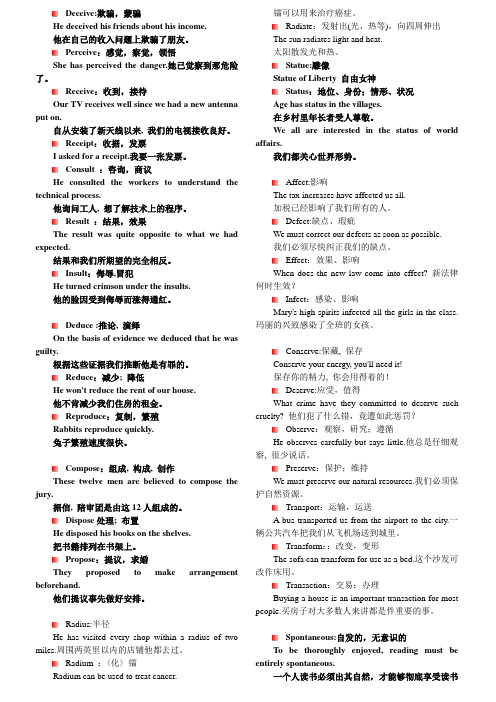
Deceive:欺骗,蒙骗He deceived his friends about his income.他在自己的收入问题上欺骗了朋友。
Perceive:感觉,察觉,领悟She has perceived the danger.她已觉察到那危险了。
Receive:收到,接待Our TV receives well since we had a new antenna put on.自从安装了新天线以来, 我们的电视接收良好。
Receipt:收据,发票I asked for a receipt.我要一张发票。
Consult :咨询,商议He consulted the workers to understand the technical process.他询问工人, 想了解技术上的程序。
Result :结果,效果The result was quite opposite to what we had expected.结果和我们所期望的完全相反。
Insult:侮辱,冒犯He turned crimson under the insults.他的脸因受到侮辱而涨得通红。
Deduce :推论, 演绎On the basis of evidence we deduced that he was guilty.根据这些证据我们推断他是有罪的。
Reduce:减少; 降低He won't reduce the rent of our house.他不肯减少我们住房的租金。
Reproduce:复制,繁殖Rabbits reproduce quickly.兔子繁殖速度很快。
Compose:组成, 构成, 创作These twelve men are believed to compose the jury.据信, 陪审团是由这12人组成的。
Dispose处理; 布置He disposed his books on the shelves.把书籍排列在书架上。
(完整版)专四词汇辨析与搭配.doc
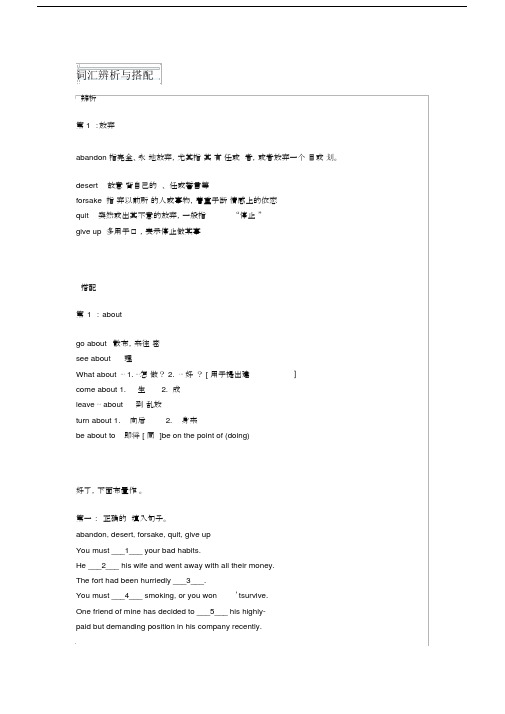
词汇辨析与搭配辨析第 1 :放弃abandon 指完全、永地放弃,尤其指其有任或者,或者放弃一个目或划。
desert 故意背自己的、任或誓言等forsake 指弃以前所的人或事物,着重于断情感上的依恋quit 突然或出其不意的放弃,一般指“停止”give up 多用于口,表示停止做某事搭配第1 : aboutgo about散布,来往密see about理What about ⋯ 1. ⋯怎做? 2. ⋯好? [ 用于提出建]come about 1.生 2. 成leave ⋯ about到乱放turn about 1.向后 2. 身来be about to即将[同]be on the point of (doing)好了,下面布置作。
第一:正确的填入句子。
abandon, desert, forsake, quit, give upYou must ___1___ your bad habits.He ___2___ his wife and went away with all their money.The fort had been hurriedly ___3___.You must ___4___ smoking, or you won’tsurvive.One friend of mine has decided to ___5___ his highly-paid but demanding position in his company recently.第一: 1. forsake2. abandoned3. deserted4. give up5. quit辨析第 2 :能力ability 指力或体力上能干某事,通常暗示把某事好的能力,后接to do, for, in 或as ,不可用of doingcapacity 常指做某事的潜力,也指容或吸收的能力,后面常接of, for 或to do faculty 指在某一方面先天具或后天造就的能力talent 在某一特殊域,尤其是在方面的天生的才能搭配第2 : accordin accord with与⋯⋯一致[同]in accordance/aggreement/line withof one ’s own accord出于自愿,主地[ 同 ]voluntarilywith one accord一致的,一致同意的[ 同 ]unanimously好了,下面布置作。
英语专四词汇辨析
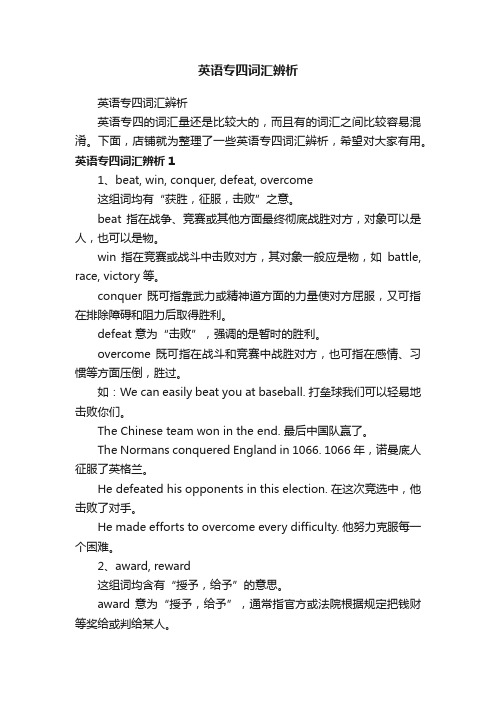
英语专四词汇辨析英语专四词汇辨析英语专四的词汇量还是比较大的,而且有的词汇之间比较容易混淆。
下面,店铺就为整理了一些英语专四词汇辨析,希望对大家有用。
英语专四词汇辨析11、beat, win, conquer, defeat, overcome这组词均有“获胜,征服,击败”之意。
beat 指在战争、竞赛或其他方面最终彻底战胜对方,对象可以是人,也可以是物。
win 指在竞赛或战斗中击败对方,其对象一般应是物,如battle, race, victory等。
conquer 既可指靠武力或精神道方面的力量使对方屈服,又可指在排除障碍和阻力后取得胜利。
defeat 意为“击败”,强调的是暂时的胜利。
overcome 既可指在战斗和竞赛中战胜对方,也可指在感情、习惯等方面压倒,胜过。
如:We can easily beat you at baseball. 打垒球我们可以轻易地击败你们。
The Chinese team won in the end. 最后中国队赢了。
The Normans conquered England in 1066. 1066年,诺曼底人征服了英格兰。
He defeated his opponents in this election. 在这次竞选中,他击败了对手。
He made efforts to overcome every difficulty. 他努力克服每一个困难。
2、award, reward这组词均含有“授予,给予”的意思。
award 意为“授予,给予”,通常指官方或法院根据规定把钱财等奖给或判给某人。
reward 意为“酬劳,奖赏”,通常指因做了某一件事或提供了某种服务而应得到的报答或酬谢。
如:He was awarded a medal for his outstanding contribution to science. 由于对科学作出了杰出贡献,他被授予一枚奖章。
专四常见词辨析

5. thing :用作“事情”解时,词义较笼统、含糊,多用于指不很具体的事。
例句:This is a miraculous thing.
这真是奇怪的事。
例如:They agreed to reserve four tickets for us.(他们答应给我们留四张票。)
2. consent :指同意别人的请求、建议或满足他人的愿望,着重意愿或感情,常和to连用。
例如:Her parents refused their consent to the marriage.(她的父母对这桩婚姻持反对态度。)
She suffered tortures from a toothache.(她受着牙痛的折磨。)
5.grief :指由某种特殊处境或原因造成的强烈的感情上的苦恼与悲痛。
Her death was a real grief.(她的去世实在令人痛心。)
6.misery :着重痛苦的可悲状态,多含不幸、可怜或悲哀的意味。
3.purpose :普通用词,既指以坚决、审慎的行动去达到的目的,又指心中渴望要实际的目标。
例如:He returned to his homeland with the purpose of serving his own people.(他返回祖国, 意在为祖国人民服务。)
4.end :指心目中怀着的某种目的,强调结果而非过程。较正式用词。
四、
1.agony :侧重指精神或身体痛苦的剧烈程度。
例如:He lay in agony until the doctor arrived.(在医生来到之前, 他一直非常痛苦地躺在那里。)
专四常考近义词辨析

专四常考近义词辨析
1. affect 和 influence:两者都有“影响”的意思,但 affect 通常指直接的、短期的影响,而 influence 则更强调长期的、深远的影响。
2. advantage 和 benefit:两者都有“好处”的意思,但 advantage 更侧重于优势、有利条件,而 benefit 则更侧重于利益、收益。
3. anxiety 和 worry:两者都有“焦虑”的意思,但 anxiety 更侧重于心理上的不安和紧张,而 worry 则更侧重于对未来的担忧和顾虑。
4. continuous 和 continual:两者都有“连续的”的意思,但 continuous 更侧重于不间断的、连续不断的,而 continual 则更侧重于有间断的、断断续续的。
5. courage 和 bravery:两者都有“勇气”的意思,但 courage 更侧重于内心的勇气和决心,而 bravery 则更侧重于外在的勇敢行为。
6. devise 和 invent:两者都有“发明”的意思,但 devise 更侧重于设计、策划,而 invent 则更侧重于创造、发明新的东西。
7. emotion 和 feeling:两者都有“情感”的意思,但 emotion 更侧重于强烈的情感体验,而 feeling 则更侧重于一般的情感状态。
以上是一些专四常考的近义词辨析,希望对你有所帮助。
在考试中,要根据具体语境和句子结构来选择合适的词汇。
英语专业四级考试——50组近义词辨析
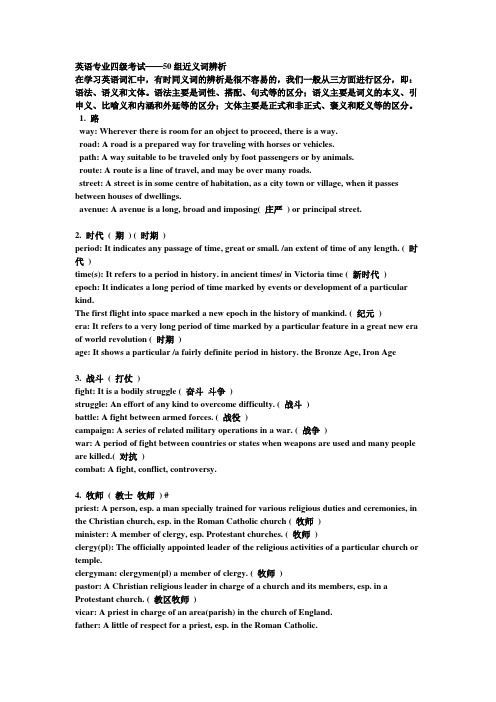
英语专业四级考试——50组近义词辨析在学习英语词汇中,有时同义词的辨析是很不容易的,我们一般从三方面进行区分,即:语法、语义和文体。
语法主要是词性、搭配、句式等的区分;语义主要是词义的本义、引申义、比喻义和内涵和外延等的区分;文体主要是正式和非正式、褒义和贬义等的区分。
1.路way: Wherever there is room for an object to proceed, there is a way.road: A road is a prepared way for traveling with horses or vehicles.path: A way suitable to be traveled only by foot passengers or by animals.route: A route is a line of travel, and may be over many roads.street: A street is in some centre of habitation, as a city town or village, when it passes between houses of dwellings.avenue: A avenue is a long, broad and imposing(庄严) or principal street.2.时代(期) (时期)period: It indicates any passage of time, great or small. /an extent of time of any length. ( 时代)time(s): It refers to a period in history. in ancient times/ in Victoria time ( 新时代) epoch: It indicates a long period of time marked by events or development of a particular kind.The first flight into space marked a new epoch in the history of mankind. (纪元)era: It refers to a very long period of time marked by a particular feature in a great new era of world revolution ( 时期)age: It shows a particular /a fairly definite period in history. the Bronze Age, Iron Age3.战斗(打仗)fight: It is a bodily struggle ( 奋斗斗争)struggle: An effort of any kind to overcome difficulty. ( 战斗)battle: A fight between armed forces. ( 战役)campaign: A series of related military operations in a war. ( 战争)war: A period of fight between countries or states when weapons are used and many people are killed.( 对抗)combat: A fight, conflict, controversy.4.牧师(教士牧师) #priest: A person, esp. a man specially trained for various religious duties and ceremonies, in the Christian church, esp. in the Roman Catholic church ( 牧师)minister: A member of clergy, esp. Protestant churches. ( 牧师)clergy(pl): The officially appointed leader of the religious activities of a particular church or temple.clergyman: clergymen(pl) a member of clergy. ( 牧师)pastor: A Christian religious leader in charge of a church and its members, esp. in a Protestant church. ( 教区牧师)vicar: A priest in charge of an area(parish) in the church of England.father: A little of respect for a priest, esp. in the Roman Catholic.5.服装clothing(collect): (fml) General term of clothes.clothes(no single): Coverings of the body such as coats, dresses, suits, shoes, hats.garment(fl): A suit of clothes used by actors./a single article of clothing.costume: 1) The fashion of dress peculiar to a people, nation, class, period, etc.2) A dress worn by actors in a play. uniform: worn by all members of the community.dress: 1) A kind of outer garment worn by women ( 连衣裙).2) worn on special occasions (礼服) evening dress/ morning dresssuit: A set of outer clothes to be worn together. evening suit/swimming suitcoat: A garment with sleeves worn on top of other clothes from rain, heat, etc.overcoat: A warn coat worn in the street.6.哭cry: The most general one.(哭泣) weep: To let flow tears.(抽泣抽嗒) sob: To weep or sigh with short quick breaths.(哭天抹泪涕泪交流) snivel: To sniffle and cry in a irritating manner.(哭嚎又哭又闹) blubber: To cry loudly noisily.(发出低声报怨声) whine: To make a low complaining cry.(嚎哭) bawl: To utter loud cries (always in bad sense).(痛哭) wail: To cry aloud from pain or sorrow.(呻吟) moan: To make a low, miserable sound in pain or sorrow.(呻吟) grown: To make a low sound of pain, unhappiness or disapproval(哀悼) mourn: To feel or show sadness or sorrow for someone who has died.(哀悼) lament: To express great sorrow or regret.7.美丽漂亮good-looking: Having an attractive appearance in a strong, healthy way used for men and women not things.beautiful: ( a woman or a thing) Suggesting symmetry of features or perfection of proportion, elegance and mobility. beautiful flowers, a beautiful girl/voice/city/face beautiful weather.handsome: Of attractive appearance applies to men. a handsomefellow/actor/horse/buildings/young man.pretty: (a girl, or a small thing) Suggesting liveliness and sweetness, pleasing or nice to look at. a pretty little woman/garden, a pretty girl/ picture/piece of music,lovely: (something) So beautiful that it makes you feel good to look at it or even to think about it. The garden looks lovely.fair: Beautiful( of woman in poet) light in color esp., skin hair.gorgeous: (persons or things) (inf) Extremely beautiful or handsome.8.拉拖pull: The most general one.draw: It implies a smoother, steadier motion and generally a lighter force than pull.drag: It usually refers to horizontal motion or motion up an incline (slope) and it suggests laborious efforts over rough ground or against friction, resistance or gravity. The escaped prisoner was dragged out of his hiding place.haul: It implies continuous pulling or dragging of heavy or bulky objects. The fisherman is hauling a net.tug: It applies to hard often sudden violent effort to pull. He tugged at my sleeve to ask directions.jerk: To pull suddenly. He jerked out the knife that was stuck in the wound.tow: To pull by a rope or chain. We towed the car to the nearest garage.wrench: To pull hard with a twisting or turning movement.9.旋转turn: The most general one.( 自转) spin:To turn quickly around a central point. It emphasizes the continuity of the action, and usually the narrow extent of the circular motion. The wheel is spinning on its axis.( 急转) whirl:To round very fast. It implies the lock of conscious control.(转动) rotate: To turn round a fixed point with a circular movement. The earth rotates once every 24 hours.(绕转) revolve:To turn or move in a circle around a central point. It indicates circular or elliptical (椭圆) movement. The planets revolve around the sun.10.生气气愤anger: The most general one.(易怒) be cross:Feeling easy to get angry.(愤慨) indignation:(fml) Anger. It stresses righteous anger at what one considers unfair, mean or shameful.We expressed our indignation at the ruthless exploitation.(愤怒) wrath:Very treat anger. (literary) It suggests a desire on intent to revenge or punish.(狂怒) rage: Wild, violent anger. It suggests loss of self- control from violence of emotion. in a rage /to fall into a rage.(暴怒) fury: Violent, extreme and destructive anger. She flew into a fury.11.错误(误会) mistake: A wrong thought, act. It implies carelessness. Anyone can make a mistake.(过错弱点) fault: A bad point, but not of a serious moral kind. It refers to behavior and character. His only fault is that he lacks ambition.find fault with sb / at faultshortcoming: weakness, failing ; It refers to failures or deficiencies in things as well as people.In spite of all her shortcomings I still think she's one of the best teachers in the school.(疏忽) error: A mistake (formal sometimes literary) It implies deviation from a standard or modelThe accident was caused by human error.(缺点毛病) defect: sth lacking or imperfect. It refers to quality.The radio was returned because of a defect.(失误过失) blunder: A very stupid or unnecessary mistake. It implies ignorance.This is the fatal blunder of his life.12.图画picture: The most general one.(彩图) painting: pictures with color.(绘画图画) drawing: A picture made with a pen, pencil and crayon. Sketch, diagrams and graphs are all drawings.(草图) sketch: A rough not detailed drawing.(图解图表) diagram: A drawing, figure that shows the arrangement of something.(曲线图) graph:A diagram in which a straight line, curved, or zigzag line shows how two sets of numbers or measurements are related.(插图) illustration: A picture to go with words of a book.(图样草图) draft: The first rough written form of anything.(平面图) plan:A line drawing of a building as it might been seen from above.(主视图) elevation:A flat upright side of a building.(海图) chart: A map esp. a detailed map of a sea area.13.特别(专门的,与众不同的) special:Different in some way from what is common, ordinary, or usual. It stresses having a quality, character, identity, or use of its own. The tube contains special gases.(特别的) especial:(fml) To an usually great degree, exceptional; It emphasizes the importance of the things or thepersons mentioned; This is a matter of especial importance. (个别的) particular:Relating or belonging to only one thing or person. It stresses the distinctness of something as anindividual which is worth notice. In that particular case, the rule doesn't hold.(适用)(特种的) specific:Detailed and exact, clear in meaning and explanation, fixed, determined.(used in scientificarticles) It implies a quality or character distinguishing a kind or a species.He gave me a very specific instruction. There is a specific tool for each job.(独特的) peculiar: Strange or perhaps unpleasant. It implies strangeness. He has a peculiar way of speaking.14.取消消灭(取消解除) cancel:To give up, to declare something is to be effective. He has cancelled his leave of absence.(消假)(废除废止) abolish:To do away with. It refers to practices, social institutions. Bad customs should be abolished.(消灭排除) eliminate:To get rid of. We should eliminate the false and retain the true. (撤消废除) repeal: To bring to an end of the effect of a law or an order. Some laws should be repealed.(根除消灭) exterminate:To destroy completely and wholly. Colonialism must be exterminated.15.破碎break: The most general one.(压碎压破) crush: To press together violently as to break, to destroy its shape by squeezing it. It suggests the effect of great external pressure. The tree fell on top of the car and crushed it.(打碎) smash: To break thoroughly to pieces with a crushing sound. She dropped the plate and smashed it.(打裂) crack:To break without separation of parts. It suggests the breaking out across a surface. He cracked the window by leaning against it.(破裂) burst:To break open by pressure from within. The fireworks burst while they were in the air.(砸碎破碎) shatter: To break into pieces. It suggests the breaking up of a thin surface. The glass was shattered to pieces.(撞坏) crash: To refer to the vehicle which hits something and is badly damaged.16.环境形势(环境形势) conditions:The location and other factors likely to affect it. It suggests something that has stayed the same for some time and which affects daily life such as food, work, and houses. We are now studying the economic conditions in the developing countries. (形势) situation: A position or state at a particular time, set of conditions, facts, and events having an effect on a person, society, etc. It suggests more general matters such as government planning and finance. The political situation in these countries are always changing.(环境周围外界) environment: The circumstances, things and conditions that influence you. It refers to spirit aspect, physical aspect and material aspect. We must try to beautify our environment.(形势情况) circumstance(s): A situation or event around us, a certain kind of atmosphere, the conditions that affect what happens. in (under) the circumstances(环境周围事物) surrounding(s): The area and environment around a place or person. It indicates a very narrow condition, "physically" sometimes reflects spiritual aspect. They lived in hostile surroundings.17.著名的well-known: (infl)famous: The most general one. widely known or honored.(杰出的知名的) distinguished: Great, outstanding marked by excellent quality or deserved fame, used especially of people who are famous for serious work in science, the arts etc. He was a distinguished writer.(驰名的) celebrated: Famous, (substitute for renowned) It refers objectively to sb or something that has been give acclaim or honoured with awards or prizes. She was a celebrated actress.renowned: Highly honored and famous for something good. often refers to places or things, also It suggests something that has become legendary or is no longer available for an objective evaluation. Edison was renowned for his inventions.noted: Well-known and admired It often describes a more intellectual kind of effort and accomplishment indicating an authority or expert or their theories. Maybe it is not widely known to the general public. He was a very noted expert.(臭名昭著) notorious:Famous for something bad. He is notorious for his crimes.18.强盗thief: The most general one.(强盗) robber:It suggests a direct confrontation in which the owner is forced to give up his valuables.(行凶强劫) mugger: A person who attacks and robs people in a street or in a lift. burglar: A person who breaks into a house at night to steal something.(歹徒暴徒) gangster: A member of a group of criminals, esp. those who are armed and use guns to threaten.(匪徒) bandit: an armed robber. It suggests an organized group in a rural setting.(土匪) brigand: A robber who lives by robbing travelers in the country.(海盗) pirate: A person who robs on the sea.19.摇动,颤动shake: The most general one. to move up and down or back and forth. It refers to persons or things.(发抖) quiver:To tremble a little. It suggests a rapid but invisible vibration. His lips quivered with emotion.(颤抖) tremble: To shake uncontrollably and slightly as from fear, cold, excitement etc. It implies uneasiness and nervousness. Her voice trembled as she began to sing.(瞬间发抖) shiver: To tremble from fear or cold. It suggests a slight and rapid movement. He stood shivering in the snow.(极度颤动) quake: to shake or tremble violently. It suggests a more violent and sudden change. He quaked with excitement. An explosion cam make the ground quake.(抽筋般颤动) shudder:To shake uncontrollably for a movement. It suggests a more intense shaking. She shuddered at the sight of a snake.20.说话谈话(说话) speak: To use your voice to say words.(说) say:To speak words.(发出声音) utter: To make sound and say words.drawl: To speak in a slow, prolonged manner.mutter: To express displeasure with compressed lips.rave: To talk in an angry, uncontrolled way.gabble: To talk rapidly, making inarticulate sounds.(谈论) remark:To mention it or comment on it.(陈述) state:To say, express or put into words, esp. formally. He stated his view.(讲述) narrate: To tell formally in writing or speech or describe something in order with intonation. He narrated his adventure in the forest.(详述) relate:To tell formally in details, to give an account of. He related his experiences. (讲演) address:To say in speech or writing to a person or group.tell: To let people know about something.talk: To say things to someone.converse: To talk formally. The scholars are conversing with each other on linguistics. chat: To talk in a friendly, familiar, informal manner. The two friends sat in a corner and chatted.chatter: To talk continuously rapidly about small things. The schoolgirls went along chattering.whisper: To talk in a low voice. She whispered me not to talk so loudly.murmur: To make a soft sound, esp. to speak or say in a quiet voice. He often murmurs to himself.(闲谈) gossip: To talk about the details of other people's actions and private lives which may not correct or proper. That woman is very fond of gossiping about others. stammer: To speak with pauses and repeated sounds because of excitement, embarrassment. stutter: To speak with pauses and repeated sounds because of inherent speech defect.21.事情,事件(事) thing:An event, a fact, a subject. He talked of many interesting things.(事情) matter:Seth that you have to deal with, something to be discussed, thought over. There are several matters to be dealt with at the meeting.(事务责任) business:A special duty, something that has to be done. Public business is every one's business.(事务) affair: An event or set of connected events. (pl) private and personal life. I have many affairs to look after.(事件) event:An important happening. Events such as birthdays and anniversaries are often celebrated. Do you know the chief events of 1986.incident: Not as important as an event. Incidents seldom are celebrated. Sometimes an event becomes an incident after many years have passed.(偶然事件) happening:An occurrence, and sometimes an unusual one. There have been strange happenings here lately.(偶发事件) occurrence: An incident that is usually unexpected and has not been planned ahead of time. Flood is practically an annual occurrence in this district.22.承认admit: To agree to the truth of, usu, something bad. It suggests reluctance or possible objection. He admitted his crime/stealing.(自白供认) confess:To admit guilt as to a crime or as to a shortcoming, in the sense of making known to others one's own error or wrong doing. He confessed his fault/doing something wrong.acknowledge: to agree the truth of, recognize the fact or existence of what have said or done, good or bad. It emphasizes openly in a embarrassing or awkward and usually not voluntary way. I acknowledged my signature/mistakes/errors/having been defeated.grant: To admit or to agree something is true. I granted his request/his honesty. take sth/sb for granted.concede: To admit as true, just or proper often unwillingly because of overwhelming evidence. I conceded you that point, but I still think you are wrong.recognize: To accept or acknowledge it. It refers to something about law and diplomacy. The new regime was recognized by China.23.走路walk: The most general one.stride: To walk with long steps. He strode through the station a few minutes before the train left.(高视阔步) stalk: To walk stiffly, slowly, and proudly with long steps.trot: To jog, move quickly, usu refers to horses.(蹒跚而行) waddle: To walk from side to side with short steps like a duck. The fat man waddled out of the room.(蹒跚) stagger:To walk unsteadily, slide and drag the feet almost falling at each step, usually because of illness, injury or drink. After drinking too much, he staggered in the street.(摇摆蹒跚) totter:To walk unsteadily showing great weakness often used of very young children learning to walk. The child tottered before his parents.(拖着脚走) shuffle: To move without lifting the feet clear of the floor as if wearing slippers. The old man shuffled along the road.(趾高气扬地走) strut: To walk in a proud strong way, esp. with the chest out and trying to look important.(慢行) amble:To walk at an easy gentle rate. It stresses a leisurely but regular movement. (闲逛) stroll:To walk, esp. slowly, for pleasure. It emphasizes a slower movement, more wandering and aimless with suggestions of many starts and pauses. They are strolling through this park.saunter: A little more formal than stroll.(漫步徘徊) wander:To move about without a fixed course, aim, or purpose. He was wandering about/down/through/up and down the street.(漫游) roam:To wander with as very clear aim. It suggests a more serious purpose behind the irregular of circular movement in complete forgetfulness of time. The lovers roamed around/through the fields.(跋涉) trudge: To walk heavily and wearily with effort as when one (plod) is tired. The hunter was trudging through the deep snow.(重步行走) tramp:To walk with firm heavy steps. Who has been tramping all over the carpet in muddy shoes.(扭扭捏捏地走) mince: To walk with little short steps in an affected manner. It was a funny sight to see her mince along.slouch: To walk in a loose, ungainly ( 不雅观) way.hustle: To walk in a busy, active way.24.跳jump: The most general one. to throw oneself into the air.(跳起) leap: (literary) To spring through the air, often landing in a different place. The boy leaped over the brook without difficulty.(跳跃) spring: To leap suddenly and quickly. He sprang to his feet at the sudden noise. (跳着跑) bound:To spring lightly along. It suggests high spirits and excitement. His dog bounded to meet me.(轻快地跑) skip:To move in a slight dancing way, as with quick steps and jumps. The little girl skipped at her mother's side.hop: To jump on one leg. The boy had hurt his leg and had to hop along.vault: To leap over something using the hands or a pole. You can vault a fence by putting your hands on it and swinging yourself over.hurdle: To jump over some thing while running. The horse hurdled the fence and ran into the woods.25.特点特征quality: The most general one.(特点) characteristic: Quality typical of a particular person and thing, a special and easily recognized quality of sb/sth. It has many scientific or technical uses. It implies neutral description in referring to any aspect of something without evaluating its relative importance to the whole. A useful characteristic of the cat is its ability to catch and kill mice. (特征) character: The combination of qualities which make a particular person, thing, place, etc. A tendency not to show emotions is supposed to be part of the British national character.(性质) nature:The qualities make someone or something different from others. It indicates the widest range of traits, including emotional, mental and physical qualities. It is only human nature to like money.(特征) attribute: A quality belonging to or forming part of the mature of a person or thing. The word is positive rather than negative. Darkness is an attribute of night.(特性) peculiarity:The quality of being peculiar, strangeness, unusualness. It shows an unpleasant attribute that is quite noticeable. One of his peculiarities is that his two eyes are not the same size.(特色) feature:A typical and noticeable part or quality. It suggests something positive and specifically. It refers to physical appearance. A lake is an important feature in this area. (品质特性) trait:A particular quality of sb/sth. It refers to more abstract attributes. Honesty and diligence are the chief traits of his character.(个性) personality: The whole nature or character of a particular person. It refers to the whole indefinable emotional coloration that a specific person gives off. He has a strong personality.26.增加increase: To make or become larger in amount or number. it refers to quantity or intensity as well as size. The population of this county has increased.add: To put together with something else so as to increase the number size, importance. He added some wood to increase the fire.(扩大) enlarge: To grown larger or wider. I want to enlarge this photograph/house.(放大) magnify:To make something appear larger than in reality, esp. by means of a lens. You have magnified the peril.(扩充) amplify: To make large or fuller, esp. give fuller information, more details etc. to amplify a radio signal/sound.augment: (fml) To become larger or greater. It emphasizes the action of addition. He augmented his income by writing some short stories.(扩展扩张) expand: To increase in range scope or volume as well as in size. Iron expands when it is heated.(加长) extend: To make longer in space or time, to extend a railway. Can't you extend your visit for a few days.27.笑(微笑) smile:The corners of your mouth move outwards and slightly upwards. He smiles his consent./with satisfaction.(大笑) laugh:To make a noise to show one's amusement and happiness. You can laugh at a joke or at an amusing sight. You can laugh at someone without being amused. They all laughed loudly.(露齿而笑) grin: To smile with the teeth. The boy grinned from ear to ear when I gave him a sweet.(暗笑含笑) chuckle: To laugh quietly. I could hear him chuckling to himself as he read that funny article.(咯咯笑) giggle: To laugh repeatedly foolishly and uncontrollably, esp. by girls. I heard them giggle when I passed by the girls.(窃笑暗笑) snicker: To laugh in a disrespectful more or less secret way. On hearing his absurd opinion, I went snickering.(假笑痴笑) simper:To smile in a silly unnatural way. When I told him the thing, he simply simpered.(得意的笑) smirk: To smile in a false or too satisfied way. He smirked at everyone that passed.(窃笑) titter:To laugh very quietly from nervousness or badly controlled amusement. The girls tittered when they heard this.(狂笑) guffaw: To laugh loudly and rudely. All the people guffawed at his silly words. (哄笑) roar:To laugh long and loudly. They roared after they heard the joke.(欢笑) chortle: To give a laugh of pleasure or satisfaction. He chortled with delight when I told him the news.(笑骂) taunt:To try to make sb angry, or upset by making unkind remarks, laughing at faults or failures. They taunted her with her inability to swim.(嘲笑嘲弄) ridicule: To laugh unkindly at or to make unkind fun of. They all ridiculed the idea.(讥笑) deride: To laugh at or make fun of as of no value. /to mock at someone with contempt They all derided his foolishness.(嘲弄) mock:To laugh at sb(sth) when it is wrong to do so, esp. by copying in a funny or contemptuous way. The students mocked the seriousness of his expression.twit: (infl) To make fun of sb because of behavior, a mistake, a fault, etc. He twitted her with her timidity.(嘲笑轻蔑地笑) scoff: To laugh at, to speak or act disrespectfully. /To speak in scornful mocking way. It was a great invention but at first many people scoffed at it.(戏弄) chaff: (infl) To make fun of sb in a good-humored way. He chaffed the man about his mistakes in speaking English.(讥笑) jeer: To laugh rudely at /to insult sb in a loud, unpleasant way. They always jeer at the priests.gibe(jibe): To laugh at with the intention of hurting the feeling with sarcastic remarks. Don't gibe at her behavior until you know the reason for it.(讥笑冷笑) sneer:To express proud dislike by a kind of usu, one- side smile or to show scorn or contempt by looks. She sneered at the furniture in his neighbor's home.joke: To make fun of. You mustn't joke with him about religion.(取笑) jest: To act or speak playful, not seriously. Don't jest about serious things.(戏弄) banter: To speak, or act playfully or jokingly. We bantered him on the subject of marriage.(轻视) scorn: To look down upon.28.疯mad: Showing that one has amanita illness which often causes them to behave in strange way.crazy: (infl) Very strange or foolish.psychotic: The most precise one. used by psychiatrists.insane: Not sound in mind. Used in scientific articles.lunatic: (old derog) wildly foolish.demented: It indicates sb's mentality has degenerated from a precious level.maniac: (n) A mad person who is violent and dangerous.29.味道smell: The most general one. It refers to something pleasant or unpleasant.odo(u)r: (fml) More used in scientific articles.fragrance: A sweet or pleasant smell. It refers to flowers and stresses a delicate smell from plants. Those roses have a delightful fragrance.scent: A smell esp. left by an animals, an pleasant smell. Our dog lost the fox's scent. perfume: A sweet or pleasant smell. It refers to either natural smell or a man-made smell and stresses a strong and rich smell compared with fragrancearoma: A strong usu pleasant smell, often a spicy smell.flavor: The particular quality of tasting good or pleasantly strong. The bread hasn't much flavor.savor: The smell of food by the processes of cooking. The meat had cooked too long and lost its savor.stink: A strong unpleasant smell. the stink of sweaty feet.stench: A very strong unpleasant smell.30.怕fear: The feeling that one has when danger is near.(可怕) dread: A great fear esp. of some harm to come. It suggests fear of facing whatever is coming. Usually dread also means loss of courage. Illness is the great dread of his life. (畏惧) fright:The feeling or experience of fear. sudden great fear. I nearly died of fright at the sight of escaped lion.(恐慌) alarm:Sudden fear and anxiety as caused by the possibility of danger and excitement caused by fear of danger. The news caused great alarm.(恐惧) terror:Extreme and intense fear. The people ran from the enemy in terror.(恐怖战栗) horror:A feeling of great shock, fear and dislike. I cried out in horror as I saw the man killed.(惊恐万状) panic:Sudden uncontrollable quickly-spreading fear or terror, which results in unreasonable and frantic activity. When I realized the situation I got into a panic.(敬畏) awe: A feeling respect mixed with fear and wonder. He always stands in awe of his father.31.闪光shine: The most general one.(闪耀) glitter: To shine brightly with flashing points of light. All that glitters is not gold. (发火花) sparkle:To shine in small flashes. It suggests uneven, bright flashes reflected from light-catching objects. We can see a diamond sparkling in the sunlight.(闪光) flash: To give out a sudden and monetary bright ray of light/ To shine suddenly for a moment.(闪耀) glisten: To shine from or as if from a wet surface. His hair glistened with oil. The wet road glistened.(闪烁) gleam: To send out a bright light moderately, mildly not violently. A cat's eye gleamed in the dark. The lantern gleamed.(冒火花) spark: To send out small bits of fire. He was so angry that his eyes sparked furiously.。
专四的词汇辨析
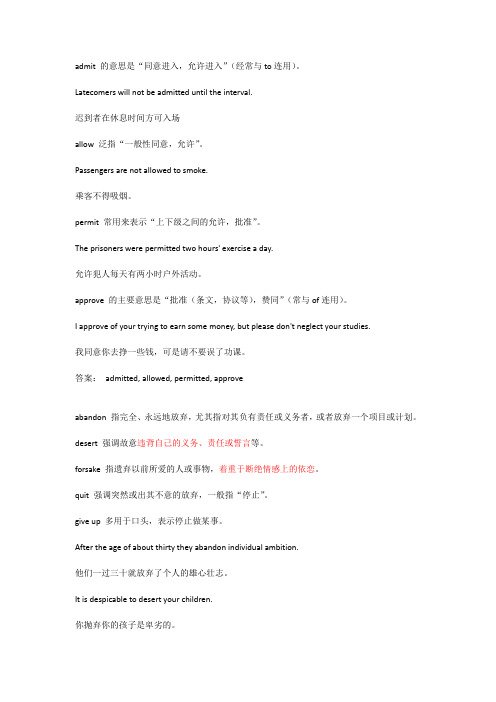
admit 的意思是“同意进入,允许进入”(经常与to连用)。
Latecomers will not be admitted until the interval.迟到者在休息时间方可入场allow 泛指“一般性同意,允许”。
Passengers are not allowed to smoke.乘客不得吸烟。
permit 常用来表示“上下级之间的允许,批准”。
The prisoners were permitted two hours' exercise a day.允许犯人每天有两小时户外活动。
approve 的主要意思是“批准(条文,协议等),赞同”(常与of连用)。
I approve of your trying to earn some money, but please don't neglect your studies.我同意你去挣一些钱,可是请不要误了功课。
答案:admitted, allowed, permitted, approveabandon 指完全、永远地放弃,尤其指对其负有责任或义务者,或者放弃一个项目或计划。
desert 强调故意违背自己的义务、责任或誓言等。
forsake 指遗弃以前所爱的人或事物,着重于断绝情感上的依恋。
quit 强调突然或出其不意的放弃,一般指“停止”。
give up 多用于口头,表示停止做某事。
After the age of about thirty they abandon individual ambition.他们一过三十就放弃了个人的雄心壮志。
It is despicable to desert your children.你抛弃你的孩子是卑劣的。
She persuaded her husband to forsake his drinking habit.她说服丈夫改掉嗜酒的习惯。
He concluded to quit on pay day.他决定在发薪水这天辞职。
- 1、下载文档前请自行甄别文档内容的完整性,平台不提供额外的编辑、内容补充、找答案等附加服务。
- 2、"仅部分预览"的文档,不可在线预览部分如存在完整性等问题,可反馈申请退款(可完整预览的文档不适用该条件!)。
- 3、如文档侵犯您的权益,请联系客服反馈,我们会尽快为您处理(人工客服工作时间:9:00-18:30)。
1、even if(=even though即便)请比较下面两个例句:You must go tomorrow if you are ready.如果你准备好了,明天你必须走。
You must go tomorrow even if you aren’t ready.哪怕你没有准备好,明天你也得走。
2、whether…or(=if…or是否)You must go tomorrow whether you are ready or not.无论你明天是否准备好了,你都必须走。
3、unless+肯定动词(=if+否定动词除非)Unless you start at once you’ll be late.相当于:If you don’t start at once you’ll be late.除非你立即动身,否则你就会迟到。
Unless you had a permit you couldn’t get a job.相当于:If you hadn’t a permit you couldn’t get a job.除非你有执照,否则你就找不到工作。
注意下面两个例句间的区别:(a)Don’t call ′me if you need help.如果你需要帮助的话,别打电话找我。
(b)Don’t call me unless you need help.除非你需要帮助否则别打电话找我。
在例句(a)中,即使在对方需要帮助的时候,说话人也不愿意去帮助对方。
在例句(b)中,在对方需要帮助的时候,说话人愿意帮助对方,但说话人不愿意对方在不要紧的时候打电话找自己。
unless+he’d/you’d like/prefer等通常可用来代替if he/you wouldn’t like 等:I’ll ask Tom,unless you’d prefer me to ask/unless you’d rather I asked Bill.我去问汤姆,除非你宁愿叫我去问比尔。
4、but for(=if it were not for/if it hadn’t been for不然)My father pays me fees.But for that I wouldn’t be here.我父亲给我一笔补贴费。
不然我就不会在这里了。
The car broke down.But for that we would have been in time.汽车出毛病了。
要不是那个我们会及时赶到的。
5、otherwise(=if this doesn’t happen/didn’t happen/hadn’t happened 否则)We must be back before midnight;otherwise we’ll be locked out.我们必须在午夜之前赶回去,否则我们就会被锁在门外。
相当于:If we are not back by midnight we’ll be locked out.如果我们不在午夜之前赶回去,我们就会被锁在门外。
Her father pays her fees;otherwise she wouldn’t be here.她的费用是她的父亲付的,否则她就不会在这里。
相当于:If her father didn’t pay her fees she wouldn’t be here.要是她的父亲不付她的费用,她就不会在这里了。
I used my calculator;otherwise I’d have taken longer.我用了计算器,不然我花的时间就会更多。
相当于:If I hadn’t used my calculator I’d have taken longer.要是我没用计算器,我花的时间就会更多。
6、在日常英语中or(+else)可以代替otherwise:We must be early or(else)we won’t get a seat.我们必须早去,否则就不会有座位了。
7、存在强烈的限制或约束的意思时,provided(that)可以代替if。
它主要用来表示允许:You can camp here provided you leave no mess.你们如果保持整洁的话,可以在这里宿营。
H suppose/supposing…?(=what if…?假如)Suppose the plane is late?相当于:What if/What will happen if the plane is late?假如飞机误点的话,将会出现什么情况?Suppose no one had been there?相当于:What if no one had been there?假如没有人去过那里的话,会怎么样?suppose也可以引出建议:Suppose you ask him?/Why don’t you ask him?假如你问一问他呢?/你为什么不问一问他呢?worth、worthy、worthwhile的用法区别这三个词都是形容词,都有“值得的”的意思,但用法或搭配关系不同。
1. worth是一个只能作表语的形容词,意思为“值……的”、“相当于……的价值的”、“有……价值的”、“值得……的”。
后接名词、接动名词的主动形式。
例如:This second-hand car is worth $2000 at the most.The exhibition is worth a visit/visiting.It’s not worth getting angry with him.The question is not worth discussing again and again.2. worthy可作表语,也可作定语。
作定语时意思为“有价值的”、“值得尊敬的”、“应受到赏识的”;用作表语时意思为“值得……的”、“应得到……的”,其后接of sth.,也可以后接to do sth.,例如:①That is worthy of note. 那件事值得注意。
②This phenomenon is worthy of being studied. 这种现象值得研究。
③This problem is worthy to be considered. 这个问题值得考虑。
④The film is worthy to be seen again. 这部电影值得再看一遍。
⑤This is a worthy English-Chinese dictionary. 这是一本有价值的英汉词典。
⑥This is a worthy article. 这是一篇值得一看的文章。
⑦He said he was not worthy to accept such honour⑧The school has educated many worthy young people.⑨The question is not worthy to be discussed again and again.作后置定语时,必须用“worthy of +名词”结构。
例如:⑩There is nothing worthy of mention. 没有值得一提的事情。
②This is behavior worthy of praise. 这是值得称赞的行为。
③Something find and rare --- something worthy of the honor of being owned by Jim.(S3 Unit 10 P84)注:“worthy of+动名词”与“worth+动名词”在形式上完全不同:worthy of后面接被动式的动名词;而worth后面接主动式的动名词,虽然在形式上是主动的,但其意义仍然是被动的。
试比较:The second-hand house is worthy of being bought. = The second-hand house is worth buying.3. worthwhile与worthy一样,既可作表语,又可作定语。
表示某事因重要、有趣或受益大而值得花时间、金钱或努力去做,一般做“值得的”、“值得做的”、“有意义的”解。
用作表语时,可接动名词或动词不定式。
例如:The Summer Palace is worthwhile going / to go to have a visit.Helping old people is a worthwhile activity.Thank you for your worthwhile suggestion.I really feel I am doing something worthwhile and I am having a great time doing it.一句多译:The place is worth a visit.The place is worthy of a visit.The place is worth visiting.It is worth visiting the place.The place is worthy of being visited.The place is worthy to be visited.It is worthwhile visiting the place.It is worthwhile to visit the place.。
